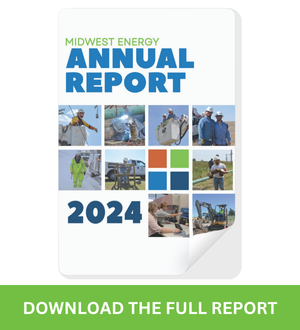We congratulate Midwest Energy employees upon completion of 21 consecutive months without a lost time accident, including the entirety of calendar year 2024. This is an extraordinary achievement for an organization of 290 employees. With assistance from the National Safety Council, management and employees have undertaken a number of projects to improve safety awareness and performance. These efforts build a safer workplace for the men and women who keep your lights on and natural gas flowing.
The change of administration in Washington, D.C., raises both hopes and concerns. Previously proposed regulations such as the EPA's Power Plant Rule threatent the reliability of the nation's electric grid at a time when demand for electricity is growing and dispatchable fossil-fueled plants are aging. The National Rural Electric Cooperative Association has gained the administration's attention on that and other regulations impacting the type and amount of reliable generating sources and transmission lines needed across the nation. The new administration also appears willing to expedite the approval process for interstate natural gas pipelines essential for generation fuel and economic growth. Such steps reinforce an "all of the above" approach to reliable and affordable energy for our nation.
Midwest Energy enjoys a long and succesful relationship with the Federal Emergency Management Agency (FEMA) and the Kansas Department of Emergency Management, resulting in millions of dollars of disaster assistance. FEMA funding mitigates rate increases after storm damage repairs. We applaud intentions to empower state and local governments in disaster preparedness and response. However, there is a risk that transferring disaster response authority and responsibility away from the federal government may not be accompanied by prior federal funding levels, which could negatively impact long-term costs and rates.
Midwest Energy is fortunate to have been selected for a $97 million federal grant for transmission system and substation upgrades in October 2023. Initial engineering work is underway, and some materials are on order. However, Build America Buy America requirements jeopardize the grant's 5-year timeline because certain essential items are not manufactured domestically. Senator Marshall's staff is aiding the process of obtaining waivers. With success, rebuilding about 150 miles of transmission lines and related substation work could start in fall 2025.
Electric reliability and economic growth in the U.S. are at risk due to insufficient dispatchable generation to replace aged facilities, increasing capacity reserve requirements, and growing loads. We continue to investigate options to meet Midwest Energy's capacity needs in an affordable manner.
A viable alternative to some portion of traditional power supply, and the associated investment, is simply reducing energy consumption when loads are highest. Midwest Energy is testing a voluntary load control option for an irrigation class this year. Participants will be notified of critical demand times. Those who reduce electric demand at least 75 percent of the time during critical perious will receive a bill credit. If the pilot program is effective, it may be expanded to other rate classes. Residential rates already include a price incentive to reduce electric use during summer peak periods.
Inflation since 2015 has far outpaced Midwest Energy's electric rates as shown in the chart on page 3. The need to rebuild transmission and distribution lines nearing the end of their useful lives will challenge this record. Based on current rebuilding plans and operating costs, Management will submit a rate increase proposal for the Board's consideration later this year, including a multi-year phase-in feature. If approved, new rates will become effective in early 2026.
Natural gas rates were adjusted at the beginning of 2025, increasing less than one percent for residential customers. The average increase across all classes was essentially $0. We continue to use a formula-based approach, so adjustments occur each year. A provision was added to collect revenue to be held in reserve as a hedge against spikes in wholesale energy prices as experienced in 2021's Winter Storm Uri. A State of Kansas lawsuit against a natural gas marketer for illegal pricing during Uri was settled for a small sum, and several class action claims on behalf of residential customers across the state were dismissed.
We are very grateful for the diligence of our employees, who continue to perform with your interests in mind in all situations. It is a privilege to serve you.
Dale Unruh, Board Chair
Patrick Parke, CEO